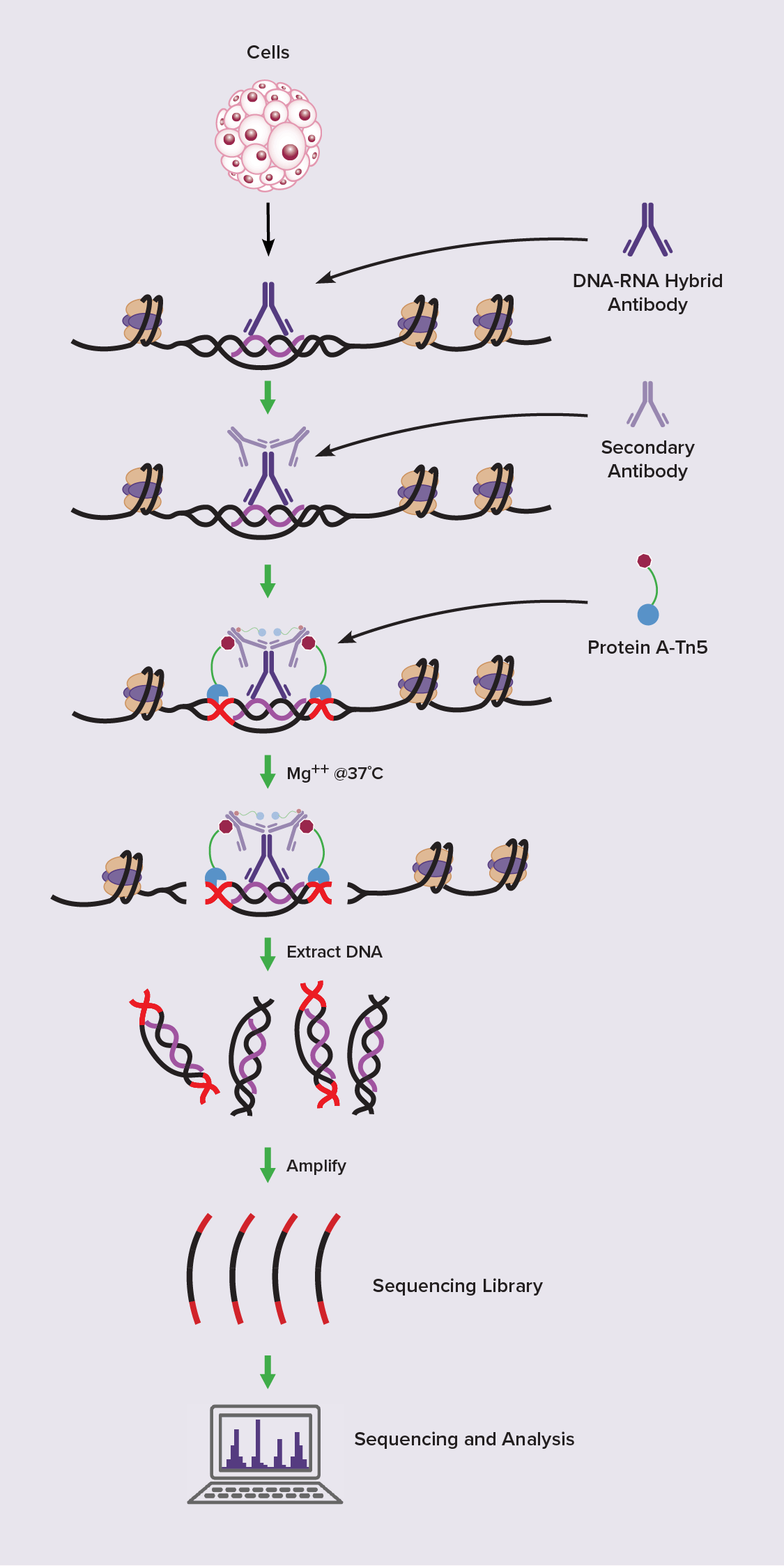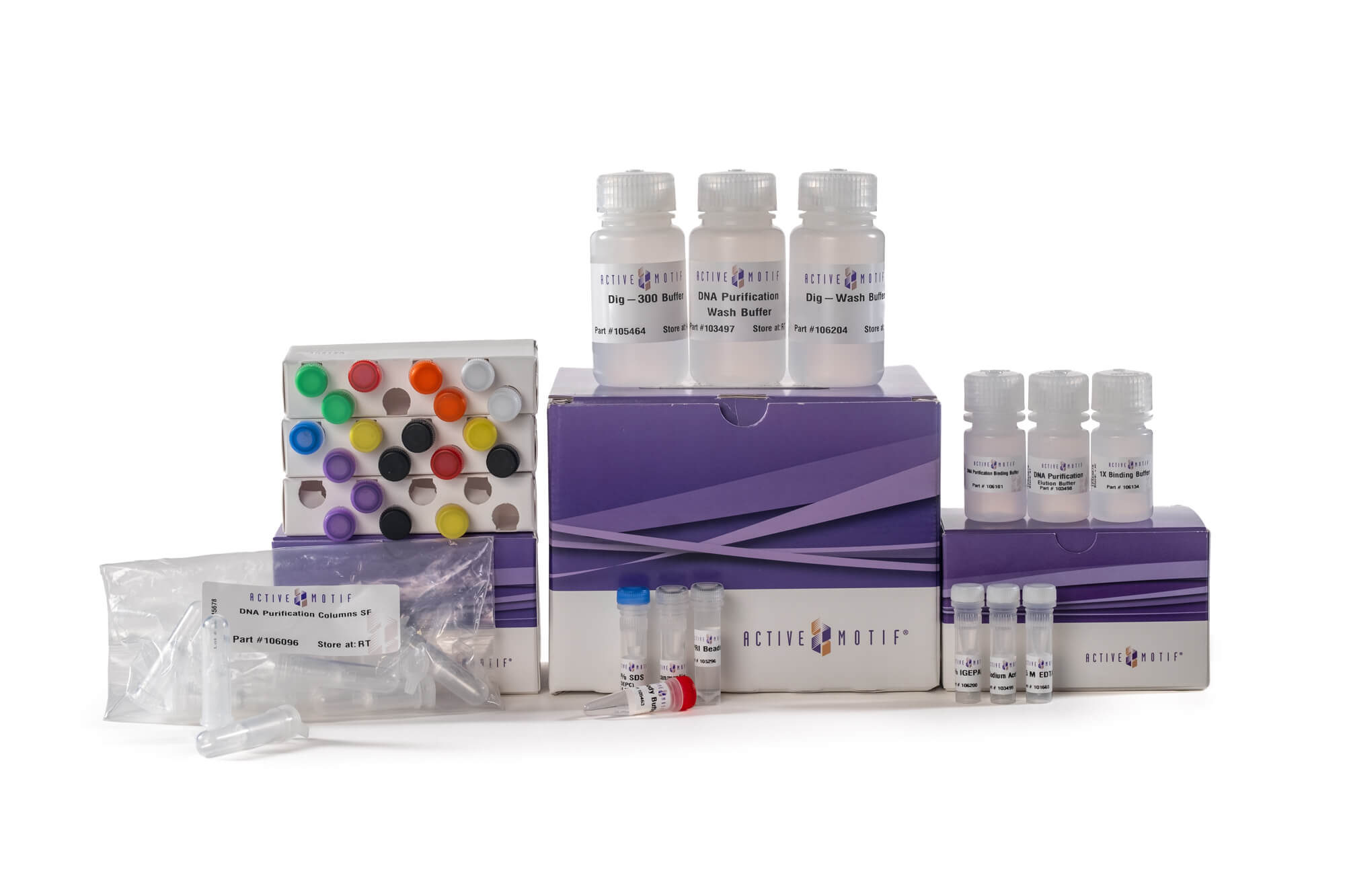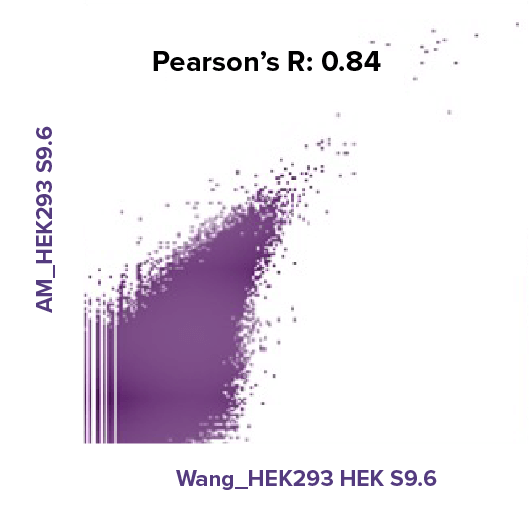CUT&Tag-IT® R-loop Assay Kit Overview
CUT&Tag (Cleavage Under Targets & Tagmentation) is a genome-wide chromatin profiling technique that utilizes an antibody-based enzyme tethering strategy to target specific histone modifications or proteins to reveal chromatin-binding locations for those proteins of interest. Following antibody binding, NGS libraries are prepared in a single step by tagmentation using the protein A-Tn5 (pA-Tn5) transposome enzyme that has been pre-loaded with sequencing adapters.
Active Motif’s CUT&Tag-IT® R-loop Assay Kit utilizes a CUT&Tag-based approach to profile R-loops genome-wide using a specifically optimized protocol for cell samples and our DNA-RNA hybrid (Clone S9.6) antibody. This is not simply the same as our CUT&Tag-IT Assay Kit with a DNA-RNA Hybrid mAb (Clone S9.6). The CUT&Tag-IT R-loop Assay Kit includes optimized DNA Binding Buffer, modified DNA Purification Columns, Q5 Polymerase Master Mix and a second mixing step during secondary antibody incubation all performed in an efficient strip-tube format protocol specifically designed for R-loop targets.
R-loops are three-stranded nucleic acid structures that are formed when a single stranded RNA invades the DNA double helix to hybridize with a complementary DNA strand, leaving the non-template DNA strand unpaired. These structures form normally during transcription initiation, IgG class switching, and mitochondrial DNA replication. They also appear normally at telomeres. Abnormal R-Loop formation is associated with DNA damage, replication fork stalling, impaired DNA repair, and genomic instability. Cancer cells with aberrantly activated transcriptional programs can have transcription-replication conflicts, enhancing the likelihood of abnormal R-loop formation.
CUT&Tag-IT R-loop Assay Kit Advantages:
- Low background and high signal-to-noise ratio compared with other chromatin profiling techniques
- Faster and more efficient than DNA:RNA immunoprecipitation (DRIP) methods and chromatin immunoprecipitation (ChIP) methods
- Compatible with 37,250 to 500,000 fresh or cryopreserved cells
This CUT&Tag-based approach to studying R-loops provides a powerful and highly sensitive new tool for investigating the formation, regulation, and function of R-loops in various biological contexts, ultimately advancing our understanding of this important molecular process.
Learn more about the CUT&Tag Assay and how it worksHow the CUT&Tag-IT R-loop Assay Works

CUT&Tag-IT® R-loop Assay Kit Contents
The CUT&Tag-IT® R-loop Assay Kit components are shipped at two temperatures, with one box on dry ice for components to be stored at -20°C, and a second box at room temperature for components that are not to be frozen and must be stored at 4°C. Please store components according to the storage conditions in the manual after first use. All reagents are guaranteed stable for 6 months from date of receipt when stored properly.
Reagents included:
- 5% Digitonin, store at -20°C
- R-loop RNase A, store at -20°C
- Protease Inhibitor Cocktail, store at -20°C
- CUT&Tag-IT® Assembled pA-Tn5 Transposomes, store at -20°C
- 10 µg/µL Proteinase K, store at -20°C
- DNA-RNA Hybrid mAb (Clone S9.6), 1 mg/mL, store at -20°C
- Rabbit Anti-Mouse Antibody, store at -20°C
- Tagmentation Buffer, store at -20°C or 4°C
- Q5 Polymerase Master Mix, store at -20°C
- i7 Indexed Primer 1, store at -20°C
- i7 Indexed Primer 2, store at -20°C
- i7 Indexed Primer 3, store at -20°C
- i7 Indexed Primer 4, store at -20°C
- i5 Indexed Primer 1, store at -20°C
- i5 Indexed Primer 2, store at -20°C
- i5 Indexed Primer 3, store at -20°C
- i5 Indexed Primer 4, store at -20°C
- 1X Binding Buffer, store at 4°C
- Dig-Wash Buffer, store at 4°C
- Concanavalin A Beads, store at 4°C
- SPRI Beads, store at 4°C
- Dig-300 Buffer, store at 4°C
- Antibody Buffer, store at 4°C
- 1% IGEPAL, store at RT
- 0.5 M EDTA, store at RT
- 10% SDS, store at RT
- DNA Purification Wash Buffer, store at RT
- DNA Purification Elution Buffer, store at RT
- DNA Purification Binding Buffer, store at RT
- 3 M Sodium Acetate, store at RT
- DNA Purification Columns SF, store at RT
CUT&Tag-IT® R-loop Assay Kit Data
Figure 1. CUT&Tag-IT R-loop Assay Kit Works with Various Cell Lines
500,000 HEK293, HCT116, SH-SY5Y, T47D, Jurkat, and MCF7 cells were assayed (top six IGV genome browser tracks) in CUT&Tag-IT R-loop Assay Kit showing R-loops at active promoter sites. For comparison, the bottom two browser tracks are 500,000 K562 cells assayed in CUT&Tag-IT Assay Kit Anti-Rabbit (Cat. No. 53160) with anti-H3K27me3 (Cat. No. 39155) and anti-H3K27ac (Cat. No. 39133).
Figure 2. CUT&Tag-IT R-loop Assay Kit specificity is demonstrated by signal depletion after RNAse treatment
500,000 K562 or HEK293 cells were assayed using the CUT&Tag-IT R-loop Assay Kit in duplicate with or without RNase A treatment. RNase A is expected to digest away R-loops thus reducing signal. The RNase A treatment clearly results in a dramatic decrease in signal, demonstrating that the CUT&Tag-IT R-loop Assay Kit specifically detects R-loops.
Figure 3. CUT&Tag-IT R-loop Assay Kit Specifically Detects R-loops: RNase A Treatment Reduces R-loop Signal but Does Not Impact CTCF CUT&Tag Signal
500,000 HEK293 cells were assayed in duplicate with CUT&Tag-IT R-loop Assay Kit or the CUT&Tag-IT Assay Kit Cat. No. 53160 using anti-CTCF (Cat. No. 61311) with or without RNase A treatment. 500,000 HEK293 cells were also assayed with the CUT&Tag-IT Assay Kit, Anti-Rabbit (Cat. No. 53160) for H3K27me3 (Cat. No. 39155) for comparison (bottom track). The RNase A treatment only decreased signal in the cells assayed with the DNA-RNA Hybrid mAb (Clone S9.6) and did not have any effect on the CTCF signal, showing that the R-loop signal is specific.
CUT&Tag-IT® R-loop Assay Kit FAQs
What is different between the CUT&Tag-IT R-loop Assay Kit and the CUT&Tag-IT Assay Kit, Anti-Mouse?
There is no visible nuclei pellet, should I proceed with the assay?
Yes, the pellet may not be visible, proceed with the protocol. Be sure to position tubes with caps oriented in centrifuge so that you know where the pellet should be in the tube, and proceed carefully with next steps.
What is the recommended sequencing depth?
25 million reads.
Why do my results have high background?
Be sure to start with viable cells. Check that cells/nuclei are intact by an automated cell counting method such as the Countess II or by Trypan Blue staining and a hemocytometer.
Will the RNase A negative control produce a library?
Yes. The RNase A treated sample will produce a library. Rnase A will significantly deplete library concentration.
Should I use an IgG control?
No. We found IgG controls to be highly variable and inconsistent in tagmentation-based assays. We recommend a no-DNA-RNA Hybrid-mAb (Clone S9.6)antibody sample as a control.
Why does this kit use RNase A and not RNase H like some publications?
We observed RNase H treatment did not completely abolish CUT&Tag signals, and the extended overnight incubation of RNase H digestion added more time to the protocol without a noticeable benefit.
See Wang et al. (2021) Sci. Adv., 7:eabe3516
What percentage of mitochondrial DNA reads are observed?
We observe a range of 36% to 67% of reads mapping to mitochondrial reads. This will vary by cell type and cell treatment.
How does the CUT&Tag-IT R-loop Assay Kit compare with published data?
We observe a Pearson’s correlation coefficient of 0.84 with our CUT&Tag-IT R-loop Assay Kit and the data from Wang et al. (2021) Sci. Adv., 7:eabe3516. Browser tracks are shown comparing our CUT&Tag-IT R-loop Assay Kit (bottom track) with the R-loop detecting sensors in Wang et al. (2021) Sci. Adv., 7:eabe3516 (top three tracks).
Can the CUT&Tag-IT R-loop Assay Kit be used for other targets such as histone modifications?
Yes, the CUT&Tag-IT R-loop Assay Kit can be used with mouse primary antibodies for other targets such as histone modifications. Be sure to use a mouse primary antibody. We do not recommend CUT&Tag for transcription factor targets.
What do library traces look like for the DNA-RNA Hybrid mAb (Clone S9.6) samples?
What do library traces look like for the DNA-RNA Hybrid mAb (Clone S9.6) samples treated with RNase A?
CUT&Tag-IT® R-loop Assay Kit Documents
You might also be interested in:
- CUT&Tag-IT Assay Kit – Tissue
- CUT&Tag-IT Assay Kit – Cells
- [Podcast] Multiple challenges of CUT&Tag
- Comprehensive Guide to Understanding and Using CUT&Tag Assays
- End-to-End CUT&Tag Service
- View Epigenetic Services
- Browse All Epigenetics Resources
US Pat. No. 10,689,643, EP Pat. No. 2999784 and related patents and applications
Permitted Use; Resale Prohibited
In the absence of an express written agreement to the contrary, all products are sold and services deliverables are provided by Active Motif for (a) internal in vitro research purposes only and may not be used for services or any other commercial purpose (b) the exclusive use of the original purchaser, and are not to be resold. You agree not to reverse engineer or otherwise attempt to discover the structure or composition of products or services deliverables unless we otherwise agree in writing.
| Name | Format | Cat No. | Price | |
|---|---|---|---|---|
| CUT&Tag-IT® R-loop Assay Kit | 16 rxns | 53167 | $1,400 | Buy |










